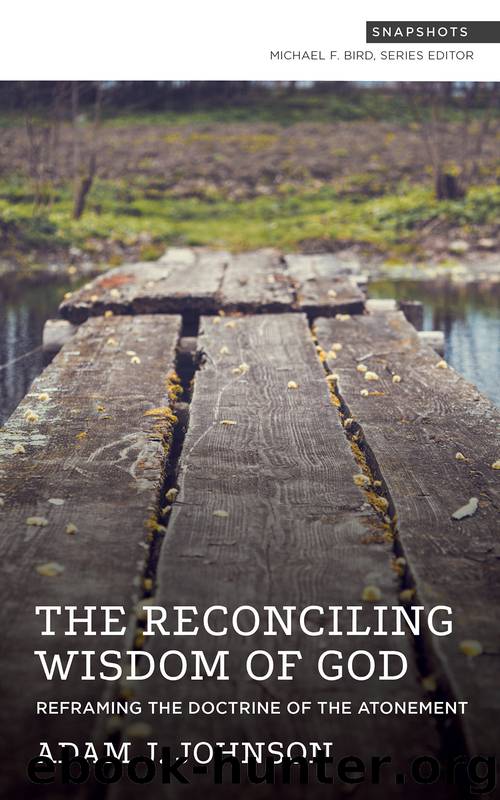The Reconciling Wisdom of God by Johnson Adam J.; Bird Michael F.;

Author:Johnson, Adam J.; Bird, Michael F.;
Language: eng
Format: epub
Tags: Atonement., Jesus Christ--Crucifixion., Redemption--Christianity.
Publisher: Bellingham, WA
Published: 2016-02-25T16:00:00+00:00
BOUNDARY MARKERS
My sense is that the “heart,” “center,” and “foundation” language used in so many discussions of the atonement is primarily a matter of boundary markers. In other words, this is not a claim about what is the “heart” and what is the “brain” or “lungs,” and neither is it a matter of securing foundational elements so as to go on to explore others. Rather, talk about the “heart” of the atonement is a way of defending a certain way of doing theology by artificially establishing penal substitution (for example) as the litmus test or “shibboleth” (Judg 12:5–7) of orthodoxy. Those who develop nonviolent theories of the atonement are setting up boundary markers just as aggressively as defenders of penal substitution; the goal is to establish a test, or defensive mechanism, to safeguard the theological task, whether that is a deeply biblical ethical safeguard from dangerous and unbiblical behavior or an equally biblical theological safeguard from dangerous and unbiblical thinking that is insufficiently Trinitarian and Christological.
However, boundary markers are not inherently evil. They play a vital role in theology, not to mention everyday life. In the introduction to The Atonement Debate, David Hilborn carefully and graciously sets the stage in terms of boundary markers, the goal of which is:
… prompt consideration of the extent to which penal substitution ought to define the limits of evangelical orthodoxy, whether it should function for evangelicals as a “centered” or a “bounded” set. Yet alongside all the key exegetical and theological work which appears in this book, these further ecclesiological and relational issues warrant close attention, lest the division which has plagued evangelical life and mission in the past be too heedlessly championed and that same gospel ministry be hampered.13
The question of what defines a denomination, evangelical theology, or a political party is valid and needful; it helps establish identity and boundaries. These not only keep out threatening forces but provide a fixed reference from which to live and move when outside the boundaries, much as a family culture and identity provide the wellspring for action and decision-making on the part of children when they are away from home. But because these matters are so important, we need to take exceptional care which markers we choose. While “good fences make good neighbors,”14 a poorly chosen boundary makes for confusion and conflict in years to come.
But approaching the atonement via wisdom offers us resources for thinking about theological boundary markers. For what is a boundary marker but a strategy, a means developed to secure a certain end, and therefore an attempt at wisdom? Boundary-marker thinking argues that the best way, the wise way, to do theology is by staking out certain ground and claiming it as our own so we can defend ourselves from corruption and attack.15 How does Wisdom’s atoning work inform the wisdom of such a strategy?
First, the wisdom of God is not primarily passive or defensive. The wisdom of God is above all active and powerful. While there is a place in God’s wisdom for defensive strategies, this is not his primary mode of action.
Download
This site does not store any files on its server. We only index and link to content provided by other sites. Please contact the content providers to delete copyright contents if any and email us, we'll remove relevant links or contents immediately.
The Secret Power of Speaking God's Word by Joyce Meyer(3180)
Signature in the Cell: DNA and the Evidence for Intelligent Design by Stephen C. Meyer(3130)
Real Sex by Lauren F. Winner(3014)
The Holy Spirit by Billy Graham(2944)
The Gnostic Gospels by Pagels Elaine(2527)
Jesus by Paul Johnson(2352)
Devil, The by Almond Philip C(2325)
23:27 by H. L. Roberts(2248)
The Nativity by Geza Vermes(2226)
Chosen by God by R. C. Sproul(2161)
All Things New by John Eldredge(2159)
Angels of God: The Bible, the Church and the Heavenly Hosts by Mike Aquilina(1957)
The Return of the Gods by Erich von Daniken(1943)
Angels by Billy Graham(1922)
Knowing God by J.I. Packer(1854)
Jesus of Nazareth by Joseph Ratzinger(1811)
The Gnostic Gospel of St. Thomas by Tau Malachi(1793)
Evidence of the Afterlife by Jeffrey Long(1786)
How To Be Born Again by Billy Graham(1777)
